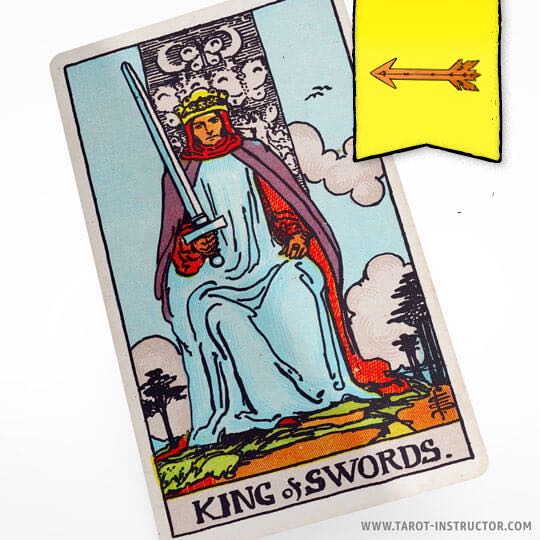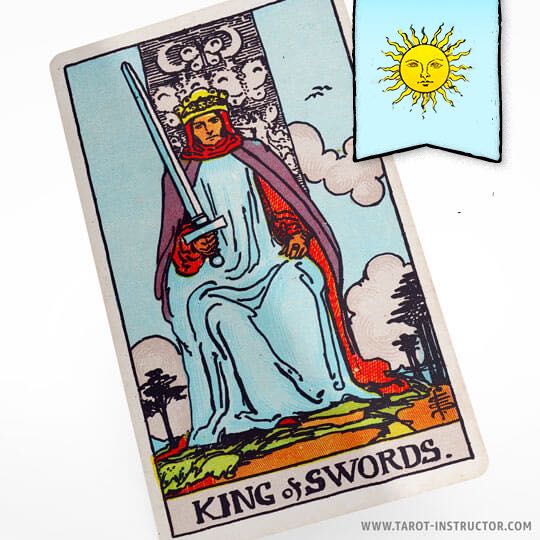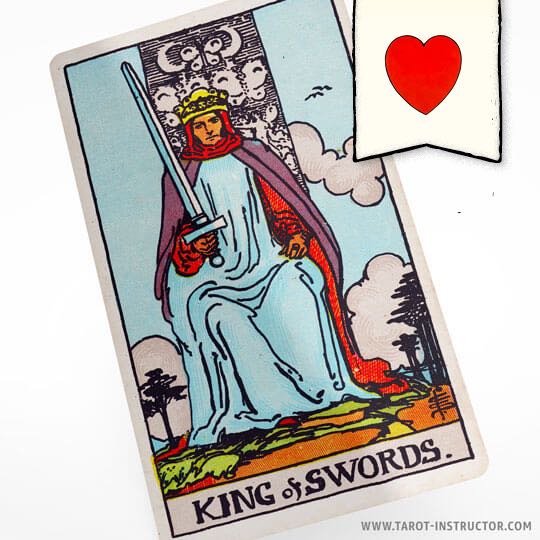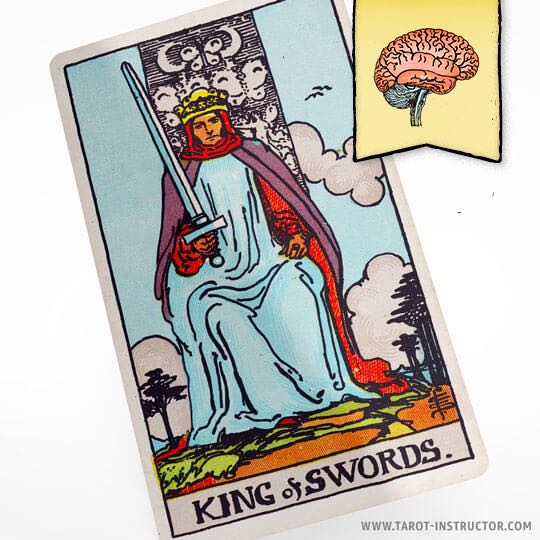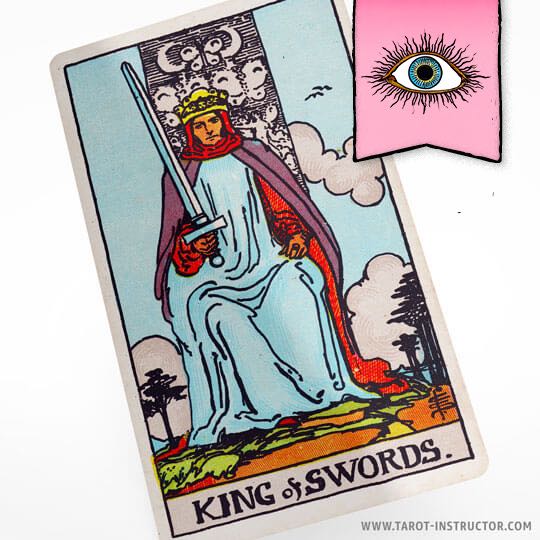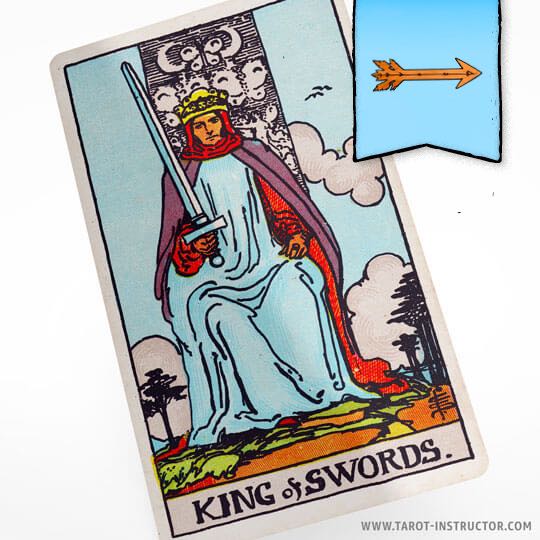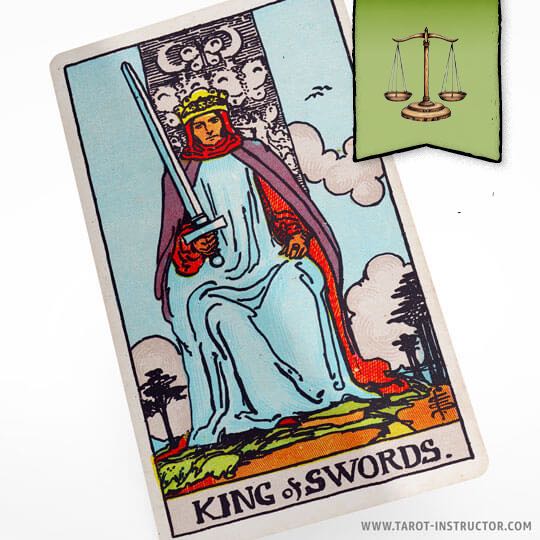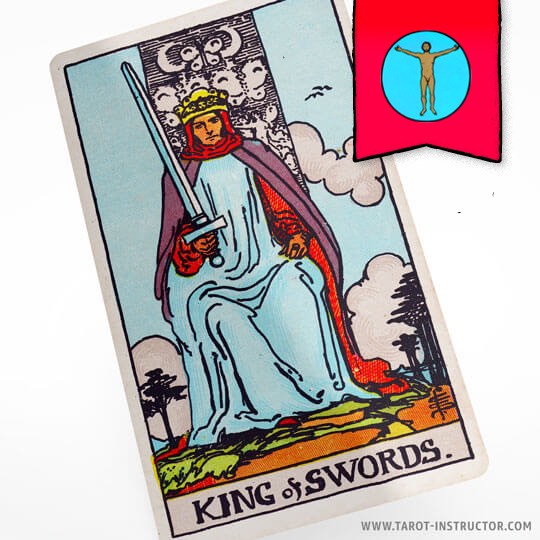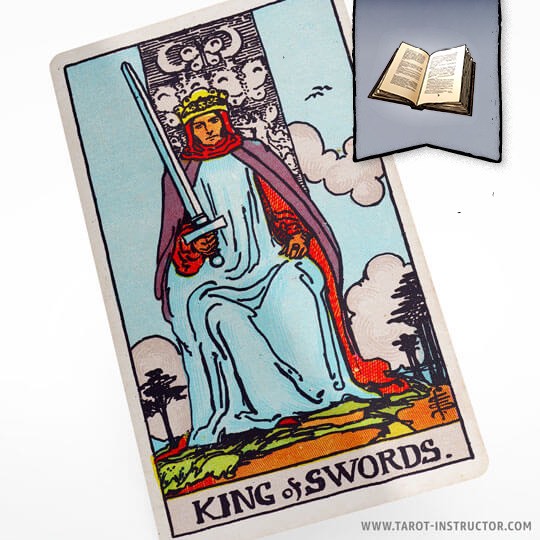King of Swords tarot card features following symbolic elements
King of Swords tarot card features following symbolic elements
Throne: In a relationship, this symbolizes stability and security, leading to feelings of trust and safety. Sword: The sword represents honesty and open communication, fostering feelings of clarity and transparency between partners. Crown: This symbolizes mutual respect, encouraging admiration and appreciation, which cultivates feelings of connection and equality. Clouds: The presence of clouds highlights the need for clear communication, suggesting feelings of confusion can arise if misunderstandings are not addressed. Butterflies: Symbolizing growth and transformation, these evoke feelings of excitement and potential for positive change within the relationship. Blue Robes: The robes represent emotional depth and wisdom, promoting feelings of compassion and intuitive understanding between partners.
Table of content
- King of Swords keywords upright
- King of Swords keywords reversed
- King of Swords card element
- King of Swords zodiac sign
- The King of Swords as Past in Potential Relationships
- The King of Swords as Past in New Relationships
- The King of Swords as Past in Existing Relationships
- The King of Swords as Past in Ex-Relationships
King of Swords as advice
„Use intellect and reason to guide your decisions.“
King of Swords keywords upright
Authority, Leadership, Rationality, Truth, Power, Justice.
King of Swords keywords reversed
Tyranny, Manipulation, Dictatorship, Confusion, Distortion, Unreasonableness.
King of Swords card element
Air
King of Swords zodiac sign
Libra
Understanding the King of Swords as Past Upright and Reversed
The King of Swords is a significant card in the Tarot, representing intellect, authority, and clarity of thought. When this card emerges in the context of past influences, it offers profound insights into various aspects of relationships—whether they are potential, new, existing, or former. In this article, we will delve into the meanings of the King of Swords as past in different relationship scenarios, both upright and reversed, providing a comprehensive understanding of its implications.
The King of Swords Card: An Overview
Before exploring its implications in relationships, it’s crucial to understand what the King of Swords as past represents in the Tarot. The King of Swords embodies qualities such as logic, fairness, and truthfulness. He is a figure of intellect, often using his mind to navigate complex situations and decisions. When interpreted in the context of the past, the King of Swords as past indicates a time when reason and clarity guided one’s interactions, particularly in relationships.
In past situations, the King of Swords as past signifies an influence that was marked by decisiveness and a strong sense of justice. This card can indicate that past relationships were governed by clear communication and understanding, emphasizing the importance of intellectual connection alongside emotional bonds. Let’s explore how the King of Swords as past manifests in various relationship contexts.
The King of Swords as Past in Potential Relationships
Upright: When the King of Swords as past appears upright in the context of potential relationships, it signifies a time when one approached new connections with clarity and discernment. This individual likely used their intellectual prowess to evaluate potential partners and their suitability. The King of Swords as past indicates that the person was not only open to new relationships but also insightful, using their judgment to navigate the complexities of attraction.
During this period, the individual may have attracted potential partners who appreciated their intellect and communication skills. The energy of the King of Swords as past fosters an environment where potential relationships could flourish based on mutual respect and understanding. The individual likely sought connections that were meaningful, valuing compatibility and shared values over superficial attraction.
The clarity provided by the King of Swords as past also suggests that the individual was willing to engage in honest conversations about intentions and desires. They may have approached potential partners with confidence, setting the stage for healthy, open communication, which is vital for any budding relationship.
Reversed: In contrast, when the King of Swords as past appears reversed regarding potential relationships, it may indicate a time of confusion or miscommunication. The individual might have struggled to express their thoughts and feelings clearly, leading to misunderstandings with potential partners. The reversed King of Swords as past suggests that fear of vulnerability or a tendency to overanalyze situations could have obstructed the formation of new connections.
Reflecting on this period, the individual may recognize missed opportunities due to a lack of clarity in their communication. They might have found themselves caught in a cycle of doubt, unable to take decisive action regarding potential relationships. The reversed King of Swords as past serves as a reminder that clear communication and openness are essential for fostering connections, and sometimes, it’s necessary to let go of overthinking to allow potential relationships to develop.
The King of Swords as Past in New Relationships
Upright: The King of Swords as past in an upright position in the context of new relationships illustrates a time marked by rationality and clarity. The individual likely entered new relationships with a well-defined sense of self and an understanding of what they wanted. This intellectual approach facilitated meaningful connections, allowing for deep discussions and the establishment of trust.
During this period, the King of Swords as past suggests that the individual placed a strong emphasis on mental compatibility. They may have engaged in stimulating conversations that helped to solidify emotional bonds. This intellectual connection fostered an environment where both partners could explore ideas, values, and aspirations openly, enhancing the overall depth of their relationship.
The energy of the King of Swords as past encourages a focus on honesty and integrity. The individual may have set clear boundaries and expectations from the outset, which helped to create a stable foundation for their new relationships. This clarity of purpose likely led to more fulfilling and balanced partnerships.
Reversed: When the King of Swords as past appears reversed in the context of new relationships, it often highlights a past characterized by emotional detachment or miscommunication. The individual may have approached new connections with skepticism or an overly critical mindset, which could have hindered their ability to connect on a deeper level. The reversed King of Swords as past suggests a propensity to prioritize logic over emotions, potentially leading to misunderstandings and a lack of emotional intimacy.
In this state, the individual might have found themselves struggling to communicate openly with new partners, leading to feelings of isolation or confusion. Reflecting on this period, they may recognize how their challenges in expressing feelings or vulnerability prevented them from fully embracing the joy of new relationships. The reversed King of Swords as past serves as a reminder of the importance of balancing intellect with emotional awareness, emphasizing that relationships thrive when both aspects are honored.
The King of Swords as Past in Existing Relationships
Upright: The King of Swords as past in an upright position concerning existing relationships suggests a time of strong communication and intellectual connection. The individual may have approached their current relationship with a sense of clarity and decisiveness, fostering an environment of trust and mutual respect. This clarity likely allowed both partners to engage in meaningful discussions about their relationship, enhancing their bond.
During this period, the King of Swords as past encourages a focus on problem-solving and collaboration. The couple may have faced challenges together, relying on their ability to communicate effectively and make rational decisions. This intellectual approach likely helped them navigate difficulties with grace, reinforcing their commitment to each other.
The energy of the King of Swords as past signifies that both partners were likely willing to engage in discussions about their future, aspirations, and goals. This level of openness created a strong foundation for their relationship, enabling them to work together towards shared dreams and aspirations.
Reversed: When the King of Swords as past appears reversed in the context of existing relationships, it often points to a period of miscommunication or emotional distance. The individual may have felt trapped in a cycle of misunderstandings or disagreements, where clear communication was lacking. The reversed King of Swords as past suggests that the couple might have struggled to address issues openly, leading to frustration and resentment.
In this state, the individual may have looked back and recognized that their inability to communicate effectively contributed to a toxic dynamic in the relationship. This reflection highlights the importance of honesty and transparency in maintaining a healthy partnership. The reversed King of Swords as past serves as a reminder that neglecting communication can erode trust and intimacy, emphasizing the need for ongoing dialogue to foster connection.
The King of Swords as Past in Ex-Relationships
Upright: In the context of ex-relationships, the King of Swords as past upright can signify a time of growth and understanding. The individual may have approached their previous relationship with clarity and intention, valuing the importance of communication and intellectual connection. While the relationship may have ended, the experiences gained from it were likely enriching, providing valuable lessons about love and partnership.
Reflecting on this ex-relationship, the individual might recognize how their ability to communicate effectively contributed to positive experiences and growth. Even if the relationship did not last, the knowledge gained during this time may have shaped their understanding of what they seek in future connections. The upright King of Swords as past suggests that this relationship was not a waste but rather a necessary step toward personal development.
Reversed: When the King of Swords as past appears reversed in the context of ex-relationships, it may indicate a time of regret or unresolved issues. The individual might look back on their previous relationship and see it as a series of misunderstandings or conflicts that never reached resolution. This energy suggests that the person may have struggled to express their thoughts clearly or may have been overly critical, leading to a breakdown in communication.
The reversed King of Swords as past can also signify a reluctance to let go of the past. The individual may find themselves caught in a cycle of regret or nostalgia, longing for what once was without acknowledging the lessons learned. This reflection can serve as a crucial lesson: to truly move forward, one must learn from past mistakes rather than dwell on them. The reversed King of Swords as past encourages individuals to embrace the lessons of the past, using them to foster healthier relationships in the future.
Conclusion
The King of Swords as past is a card rich with meaning and implications, especially when considering its influence on relationships. In its upright position, it represents clarity, communication, and rationality, while in its reversed state, it warns of miscommunication, emotional detachment, and unresolved issues. By examining the King of Swords as past in various relationship scenarios—potential, new, existing, and ex-relationships—we can gain valuable insights into our past behaviors and choices.
Understanding these dynamics can empower individuals to embrace their journey toward love with a renewed sense of clarity and purpose. Whether learning from past mistakes or celebrating positive experiences, the King of Swords as past reminds us that every relationship contributes to our growth and understanding of ourselves and others. Ultimately, the journey through love is an intellectual and emotional exploration worth undertaking, filled with lessons that shape who we are and who we aspire to be.
Source: Wikipedia King of Swords tarot card meaning
Reddit King of Swords as love advice
Quora King of Swords meaning
Unlock the mysteries of tarot cards.
